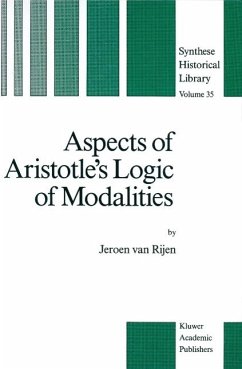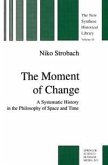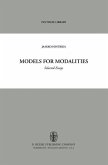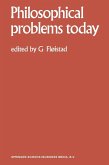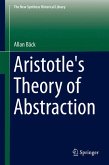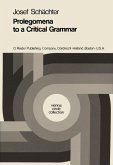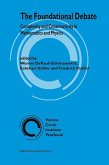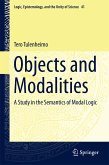J. van Rijen
Aspects of Aristotle's Logic of Modalities (eBook, PDF)
113,95 €
113,95 €
inkl. MwSt.
Sofort per Download lieferbar

57 °P sammeln
113,95 €
Als Download kaufen

113,95 €
inkl. MwSt.
Sofort per Download lieferbar

57 °P sammeln
Jetzt verschenken
Alle Infos zum eBook verschenken
113,95 €
inkl. MwSt.
Sofort per Download lieferbar
Alle Infos zum eBook verschenken

57 °P sammeln
J. van Rijen
Aspects of Aristotle's Logic of Modalities (eBook, PDF)
- Format: PDF
- Merkliste
- Auf die Merkliste
- Bewerten Bewerten
- Teilen
- Produkt teilen
- Produkterinnerung
- Produkterinnerung

Bitte loggen Sie sich zunächst in Ihr Kundenkonto ein oder registrieren Sie sich bei
bücher.de, um das eBook-Abo tolino select nutzen zu können.
Hier können Sie sich einloggen
Hier können Sie sich einloggen
Sie sind bereits eingeloggt. Klicken Sie auf 2. tolino select Abo, um fortzufahren.

Bitte loggen Sie sich zunächst in Ihr Kundenkonto ein oder registrieren Sie sich bei bücher.de, um das eBook-Abo tolino select nutzen zu können.
Zur Zeit liegt uns keine Inhaltsangabe vor.
- Geräte: PC
- ohne Kopierschutz
- eBook Hilfe
- Größe: 19.02MB
Andere Kunden interessierten sich auch für
![The Moment of Change (eBook, PDF) The Moment of Change (eBook, PDF)]() N. StrobachThe Moment of Change (eBook, PDF)177,95 €
N. StrobachThe Moment of Change (eBook, PDF)177,95 €![Models for Modalities (eBook, PDF) Models for Modalities (eBook, PDF)]() Jaakko HintikkaModels for Modalities (eBook, PDF)113,95 €
Jaakko HintikkaModels for Modalities (eBook, PDF)113,95 €![Philosophical Problems Today / Problèmes Philosophiques d'Aujourd'hui (eBook, PDF) Philosophical Problems Today / Problèmes Philosophiques d'Aujourd'hui (eBook, PDF)]() Philosophical Problems Today / Problèmes Philosophiques d'Aujourd'hui (eBook, PDF)40,95 €
Philosophical Problems Today / Problèmes Philosophiques d'Aujourd'hui (eBook, PDF)40,95 €![Aristotle's Theory of Abstraction (eBook, PDF) Aristotle's Theory of Abstraction (eBook, PDF)]() Allan BäckAristotle's Theory of Abstraction (eBook, PDF)73,95 €
Allan BäckAristotle's Theory of Abstraction (eBook, PDF)73,95 €![Prolegomena to a Critical Grammar (eBook, PDF) Prolegomena to a Critical Grammar (eBook, PDF)]() Josef SchächterProlegomena to a Critical Grammar (eBook, PDF)73,95 €
Josef SchächterProlegomena to a Critical Grammar (eBook, PDF)73,95 €![The Foundational Debate (eBook, PDF) The Foundational Debate (eBook, PDF)]() The Foundational Debate (eBook, PDF)113,95 €
The Foundational Debate (eBook, PDF)113,95 €![Objects and Modalities (eBook, PDF) Objects and Modalities (eBook, PDF)]() Tero TulenheimoObjects and Modalities (eBook, PDF)73,95 €
Tero TulenheimoObjects and Modalities (eBook, PDF)73,95 €-
-
-
Zur Zeit liegt uns keine Inhaltsangabe vor.
Dieser Download kann aus rechtlichen Gründen nur mit Rechnungsadresse in A, B, BG, CY, CZ, D, DK, EW, E, FIN, F, GR, HR, H, IRL, I, LT, L, LR, M, NL, PL, P, R, S, SLO, SK ausgeliefert werden.
Produktdetails
- Produktdetails
- Verlag: Springer Netherlands
- Seitenzahl: 238
- Erscheinungstermin: 6. Dezember 2012
- Englisch
- ISBN-13: 9789400926516
- Artikelnr.: 43983719
- Verlag: Springer Netherlands
- Seitenzahl: 238
- Erscheinungstermin: 6. Dezember 2012
- Englisch
- ISBN-13: 9789400926516
- Artikelnr.: 43983719
- Herstellerkennzeichnung Die Herstellerinformationen sind derzeit nicht verfügbar.
One/ Subject and Programme.- 1. Introduction.- 2. Quandaries in recent Aristotle research.- 3. The programme of this study.- Notes to Chapter One.- Two/ The General Doctrine I Some Theorems and Rules.- 1. Multifariousness and common core.- 2. A provisional assumption.- 3. Common properties.- 4. Comparisons.- Notes to Chapter Two.- Three/ The General Doctrine II Absolute and Qualified Modalities.- 1. Introduction.- 2. Qualified vs. absolute modalities.- 3. Qualified necessity, syllogisms and the proof per impossibile.- 4. Absolute impossibility and the commensurability of the diagonal.- 5. Real and assumed background knowledge.- 6. Relations between temporal and modal concepts.- Notes to Chapter Three.- Four/ Modality and Time (I) The Principle of Plenitude.- 1. Introduction.- 2. The Principle of Plenitude and its role in Aristotle's modal thinking.- 3. The evidence.- Notes to Chapter Four.- Five/ Modality and Time (II) De Caelo I.12 and The Necessity of What is Eternal.- 1. The problem.- 2. Williams and the supposed logical errors.- 3. Hintikka and the confusion in Aristotle's "Master Argument".- 4. Judson and the "grossness of Aristotle's fallacy".- 5. The metaphysics in De Caelo I.12 as exposed by Waterlow.- 6. De Caelo I.12 and the necessity of what is eternal.- 7. Some extrapolations and the role of hylê phthartê.- Notes to Chapter Five.- Six/ Modality and Time (III) De Interpretations 9.- 1. Introduction.- 2. The traditional views.- 3. De Interpretations 9 on the statistical reading.- 4. Deliberation and chance events in De Interpretatione 9.- 5. The interpretation.- Notes to Chapter Six.- Seven/ Posterior Analytics I.4-6 The De Omni-Per Se Distinction.- 1. Introduction.- 2. Zabarella on Aristotelian necessity.- 3. Inseparable accidents.- 4. Afirst look at Posterior Analytics I.4-6.- 5. Some commentaries on Posterior Analytics I.4 and 6.- 6. Real or conceptual modalities?.- 7. Aristotle, matter, and definition.- Notes to Chapter Seven.- Eight/ Posterior Analytics I.4-6 Names and Naming.- 1. Abstraction in Metaphysics XIII.3.- 2. Abstraction and naming.- 3. The issue of names and naming.- 4. A new look at Posterior Analytics I.4-6, part one.- 5. Some major differences.- 6. A new look at Posterior Analytics 1.4-6, part two.- 7. Belonging kath' hauto and homogeneity.- 8. Homogeneity, the necessity of what is always and the concept of possibility.- Notes to Chapter Eight.- Nine/ Apodeictic Syllogistic.- 1. Introduction.- 2. External criticism.- 3. The nature of Aristotle's syllogistic theory.- 4. Apodeictic syllogistic.- 5. Incoherence.- 6. McCall's reconstruction.- 7. The four apodeictic categorical sentences and apodeictic ecthesis.- 8. The apodeictic conversion rules.- 9. The apodeictic Barbaras and domains of discourse.- 10. The status of ALuu.- 11. The soundness of the inference base.- 12. Conversion rules and shifts of type of predication.- 13. Conclusions.- Notes to Chapter Nine.- Index of Names.- Index of Subjects.
One/ Subject and Programme.- 1. Introduction.- 2. Quandaries in recent Aristotle research.- 3. The programme of this study.- Notes to Chapter One.- Two/ The General Doctrine I Some Theorems and Rules.- 1. Multifariousness and common core.- 2. A provisional assumption.- 3. Common properties.- 4. Comparisons.- Notes to Chapter Two.- Three/ The General Doctrine II Absolute and Qualified Modalities.- 1. Introduction.- 2. Qualified vs. absolute modalities.- 3. Qualified necessity, syllogisms and the proof per impossibile.- 4. Absolute impossibility and the commensurability of the diagonal.- 5. Real and assumed background knowledge.- 6. Relations between temporal and modal concepts.- Notes to Chapter Three.- Four/ Modality and Time (I) The Principle of Plenitude.- 1. Introduction.- 2. The Principle of Plenitude and its role in Aristotle's modal thinking.- 3. The evidence.- Notes to Chapter Four.- Five/ Modality and Time (II) De Caelo I.12 and The Necessity of What is Eternal.- 1. The problem.- 2. Williams and the supposed logical errors.- 3. Hintikka and the confusion in Aristotle's "Master Argument".- 4. Judson and the "grossness of Aristotle's fallacy".- 5. The metaphysics in De Caelo I.12 as exposed by Waterlow.- 6. De Caelo I.12 and the necessity of what is eternal.- 7. Some extrapolations and the role of hylê phthartê.- Notes to Chapter Five.- Six/ Modality and Time (III) De Interpretations 9.- 1. Introduction.- 2. The traditional views.- 3. De Interpretations 9 on the statistical reading.- 4. Deliberation and chance events in De Interpretatione 9.- 5. The interpretation.- Notes to Chapter Six.- Seven/ Posterior Analytics I.4-6 The De Omni-Per Se Distinction.- 1. Introduction.- 2. Zabarella on Aristotelian necessity.- 3. Inseparable accidents.- 4. Afirst look at Posterior Analytics I.4-6.- 5. Some commentaries on Posterior Analytics I.4 and 6.- 6. Real or conceptual modalities?.- 7. Aristotle, matter, and definition.- Notes to Chapter Seven.- Eight/ Posterior Analytics I.4-6 Names and Naming.- 1. Abstraction in Metaphysics XIII.3.- 2. Abstraction and naming.- 3. The issue of names and naming.- 4. A new look at Posterior Analytics I.4-6, part one.- 5. Some major differences.- 6. A new look at Posterior Analytics 1.4-6, part two.- 7. Belonging kath' hauto and homogeneity.- 8. Homogeneity, the necessity of what is always and the concept of possibility.- Notes to Chapter Eight.- Nine/ Apodeictic Syllogistic.- 1. Introduction.- 2. External criticism.- 3. The nature of Aristotle's syllogistic theory.- 4. Apodeictic syllogistic.- 5. Incoherence.- 6. McCall's reconstruction.- 7. The four apodeictic categorical sentences and apodeictic ecthesis.- 8. The apodeictic conversion rules.- 9. The apodeictic Barbaras and domains of discourse.- 10. The status of ALuu.- 11. The soundness of the inference base.- 12. Conversion rules and shifts of type of predication.- 13. Conclusions.- Notes to Chapter Nine.- Index of Names.- Index of Subjects.
